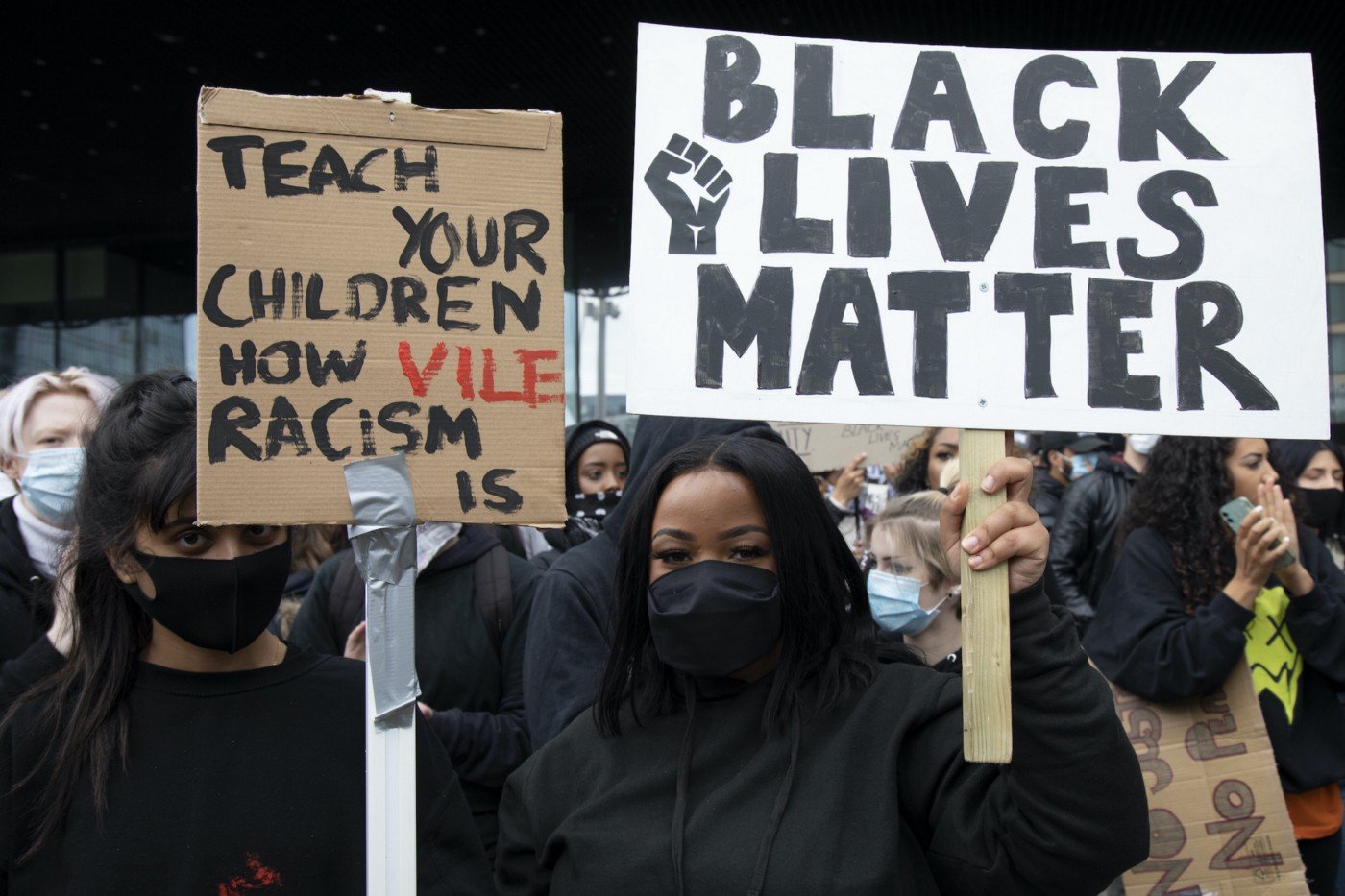
Demonstrators hold signs at a Black Lives Matter protest in Birmingham, England, on June 4, 2020. Photo: Mike Kemp/In Pictures via Getty Images
In recent days, headlines in America have been dominated by pundits raising awareness about the widespread racial inequality in America following the brutal murder of George Floyd and Rayshard Brooks by white police officers and the subsequent race riots that have occurred across the nation. Both murders were horrific and unjustifiable. However, it is pivotal to note that in our quest for equality and justice, not only African Americans have suffered from racist prejudice and other instances of bigotry should not be neglected at this critical hour.
Jews, Hindus, Maronite Christians, Muslims, and other groups have also suffered from religious prejudice and their struggle for justice should not be neglected merely because they have not taken to the streets in protest. Indeed, if the recent protests in America have taught us anything, it is that we should all be fighting against all forms of racism.
During the recent race riots in America, a Maronite Church was defaced with hateful graffiti. Around the same period of time, five synagogues and three Jewish schools fell victim to hate crimes. One of the synagogues was defaced with graffiti that read “f_ck Israel.” Another Moroccan Jewish synagogue had graffiti reading “f_ck pigs” written on it as well. A statue of Raoul Wallenberg, the Swedish diplomat who saved thousands of Hungarian Jews from the Nazis, was smeared with anti-Semitic slogans.
Jewish owned businesses and buildings were also looted and targeted with anti-Semitic graffiti. In fact, according to Yeshiva World News, nearly 75% of the Jewish-owned stores in an Orthodox enclave in Beverly Hills were looted. Closer to home in the Washington, DC area, the windows of Chai Bar, a Kosher restaurant, were smashed. Another kosher restaurant, Shouk, was looted and set on fire.
More recently, the Anti-Defamation League reported than an anti-Semitic flier has been circulated, which proclaims, “If Jewish Americans make up two percent of the population, why do they get a special privilege when it comes to top universities? Ending white privilege intersects ending Jewish privilege.”
This flier has been circulated at a time when there are many tweets speculating that George Soros, a Jewish billionaire, stands behind the recent race riots in America. Such incitement will do nothing but encourage more violence against Jews in America, at a time when anti-Semitic hate crimes are at an all time high. Yet sadly, the anti-Semitism that has come to the fore during these race riots is not being widely covered by mainstream American media outlets.
As Mendi Safadi, who heads the Safadi Center for International Diplomacy, Research, Public Relations and Human Rights noted, there are different types of racism, including racism based on skin color, ethnic racism and religiously based racism. Racism based on skin color is what existed in the Jim Crow South, while the Kurds experience ethnically based racism in countries like Turkey, Iran, Iraq and Syria.
According to Safadi, religiously based racism is what Jews and the Hindus of Bangladesh and other religious minorities in places like Syria experience: “A mixture of different religions is considered unacceptable to such people.” As a consequence Syria and Bangladesh have seen the horrors of ethnic cleansing.
Shipan Kumer Basu, who heads the World Hindu Struggle Committee, proclaimed, “The percentage of Hindus living in Bangladesh has gone down from more than 30% of the total population in 1947 to a mere 7% today. The heinous crimes that have been committed against the Hindus are physical assault, rape, murder and forced conversions. These crimes take place on a daily basis in Bangladesh.”
Basu himself was imprisoned for his work advocating for persecuted Hindus in Bangladesh and he called upon other members of the international community to take a stand against anti-Hindu racism: “We have been striving for the rights of all Hindus in the Indian subcontinent for the last twenty years and have been able to convey our message on behalf of the Hindu community to different human rights groups such as the United Nations and other international groups about the plight of Hindus in Bangladesh, Afghanistan and Pakistan. Historically, Hindus were oppressed in Bangladesh, Afghanistan and Pakistan”
“Our struggle for peaceful coexistence for the Hindu Community along with other religious sects will continue until we obtain equality,” he declared. “Like the protesters in America, we seek for racism to come to an end. As the Americans fight against racial inequality, Hindus are still getting murdered in Bangladesh merely due to the racism against them One African American man was killed and the American people are on strike, and they are doing many things to stop racial inequality. But in Pakistan and Bangladesh, Hindus are killed and nothing happens. As we are facing the coronavirus pandemic, we feel frustrated and depressed that the persecution of Hindus has increased exponentially. Hindu lands are being taken away by force. Hindu girls are getting abducted and forced into marriages. It is time to break the silence on this.”